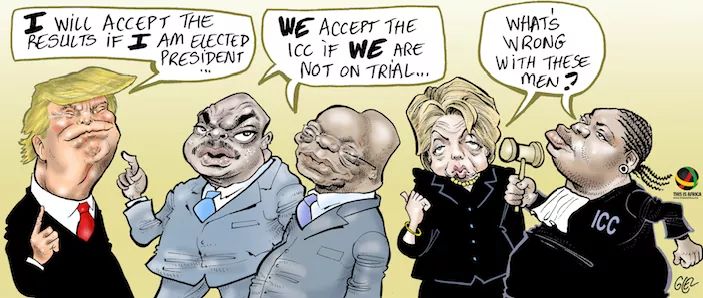Quid Justitiae lance un symposium à l’occasion de la 17e Assemblée des États Parties [ASP17 / AÉP17 (2018)]
Cette année encore, Quid Justitiae s’associe au Partenariat canadien pour la justice internationale à l’occasion de l’Assemblée des États Parties (AÉP) à la Cour pénale internationale, dont la 17e édition se déroule à La Haye, aux Pays-Bas, du 5 au 12 décembre 2018. Pendant cet événement, des représentant.e.s des États ayant ratifié le Statut de Rome ou y ayant accédé se rassemblent pour prendre des décisions cruciales concernant la Cour. De multiples événements parallèles sont aussi organisés par des organisations de la société civile pour stimuler les discussions et trouver des solutions aux problèmes qui entravent la réalisation du projet envisagé lors de l’adoption du Statut de Rome. Dans ce contexte, Quid Justitiae diffuse les billets écrits par les étudiant.e.s du Partenariat qui participent à l’AÉP. Ces billets résument, vulgarisent et analysent les événements qui surviennent à l’AÉP.
La première contribution à ce symposium est offerte par Sarah Nimigan et concerne la politisation de la Cour pénale internationale.

The year 2018 marks the twenty-year anniversary of the Rome Statute, adopted on July 17, 1998, for the establishment of an International Criminal Court (ICC). This makes the annual session of the Assembly of States Parties (ASP), from December 5 to 12 in The Hague (Netherlands), especially significant. Commentators have signaled that this is a relatively uncontroversial ASP, focusing largely on budget: the so called ‘zero nominal growth’ policy taken by some key states parties (Canada, France, Germany, Spain, Italy, Japan, and the UK) in past years has resulted in insufficient resources being allocated to the Court. While the budgetary contribution on the part of states may have been satisfactory upon the Court’s inception, the evolutionary increase in investigations, caseload, and the overall financial burden of greater outputs requires more resources to operate both efficiently and effectively.
The question of the ICC’s effectiveness is an important feature of this year’s ASP, and for good reason. The bold assertions of non-cooperation made by United States National Security Advisor John Bolton, which were echoed by United States President Donald Trump, raise pointed concerns with respect to the future of the ICC. Yet, the US relationship with the ICC has been mixed, depending on the administration of the day and its variable approach to the Court. For example, the Clinton administration took a particularly active role in negotiating the Rome Statute, only to rescind this signature and support under Bush in the final hour. When the US allowed the referral of the Darfur situation to go through the United Nations Security Council in 2005 (instead of using the veto, which was US customary practice with respect to ICC involvement beforehand), the overall consensus was that the US was softening its position towards the ICC. When the Obama administration came to power in 2008, the US relationship with the ICC became even less strained. While the ratification of the Rome Statute was not a priority, the US sent 100 non-combat troops to aid in the capture of Joseph Kony in Uganda in 2011, and lobbied Security Council members to refer the situation in Libya to the ICC. The US took an active role in defining the crime of aggression and expressed an interest in helping with ICC investigations. So, what to make of the reversion made by the current administration?
The bigger problem does not begin and end with contemporary US opposition to the ICC. The issue of strong politicization has hampered the effectiveness and robustness of the ICC for years. As seen in Burundi in 2016, governments abandon and withdraw from the ICC when there is a fear of punishment and accountability for bad behaviour. Similar action has been taken by the Philippines, whose president also withdrew from the ICC following the opening of a preliminary examination into alleged crimes there earlier this year.
Just as significant, the proverbial ‘elephant in the room’ seems to be the pending withdrawal of South Africa, whose Justice Minister Michael Masutha claimed at a symposium in August of this year that the Court imposes competing obligations to the African Union (AU) and international law, with specific reference to the contentious ‘immunity’ of sitting heads of state. He affirmed that South Africa has full intention of withdrawing from the ICC. However, it is worth noting that South Africa’s International Relations Minister Lindiwe Sisulu has said that new President Ramaphosa was reviewing the previous administration’s decision to withdraw from the ICC. While it is unclear what consequence this will have, the South African position on the ICC may be viewed with reserved optimism at the moment.
The demise of this relationship was triggered by the fallout in 2015 following al-Bashir’s attendance at an AU Summit in Sandton (South Africa). The ICC demanded that South Africa arrest and surrender him – yet government authorities facilitated his escape from the country. It became apparent that the then-government of South Africa prioritized its obligation to the AU over and above any obligation to the ICC. This relationship breakdown is particularly significant given the prominent role taken by South Africa in the negotiation of the Rome Statute, coupled with South Africa’s historical promotion of human rights on the continent and across the world in the post-apartheid era.
Under the Rome Statute system, the ICC is only as strong as states allow it to be, since it fundamentally relies upon state cooperation to fulfil its mandate. To be sure, there is a direct correlation between cooperation and effectiveness. Therefore, if states are not cooperating, it becomes necessary to examine why. From the purview of international criminal law advocates, when states withdraw to avoid accountability, it raises serious doubts about the legitimacy of that particular state, and not of the ICC per se. For example, although Burundi’s withdrawal notice focused on the ICC’s hyper-focus on African situations, this legitimate criticism is muddled by evidence of crimes against humanity including: extrajudicial killings, disappearances, arbitrary arrests and detentions, torture and sexual violence that the United Nations Commission of Inquiry on Burundi reported on in September 2017.
In the Philippines, the notice of withdrawal stemmed from claims made by President Rodrigo Duterte that the ICC was being used as a ‘political tool’. The ICC’s preliminary investigation in the Philippines looked into alleged crimes against humanity perpetrated by Duterte and top officials with respect to a war on drugs that has killed thousands in abhorrent ways. Claims of due process violations, complementarity issues and the like are weighty, yet overshadowed by plainly bad behaviour on the part of the President and other top state officials. Here again, even if discontent with the ICC was well-founded, any attempt to skirt accountability for alleged criminal behaviour taints the perceived credibility of the government’s claims. It would have been far more constructive to have a meaningful conversation and reach some form of mediation or compromise rather than abandoning the ICC altogether. Yet, this is not the reality and it is imperative that international criminal law supporters ensure that these decisions to withdraw from the ICC do not permanently recede or damage the legitimacy of the project (and norms) overall. This will be an important task at the ASP and beyond.
Fortunately, the Prosecutor preserves temporal jurisdiction over crimes allegedly committed during the time that Burundi and the Philippines were States Parties to the Rome Statute, i.e. before the respective withdrawals came or come into effect. Yet, the ability of the Prosecutor to properly investigate these alleged crimes is seriously challenged in the wake of withdrawal. From an international relations perspective, at least in realist terms, it is obvious that states reject international criminal law when it threatens that states’ relative interests and power. What is less clear is how the international criminal justice norms can guide the behaviour of other states, institutions, and organizations to undermine and/or shame these self-interested acts. It is highly important for states to assert a shared commitment to this global norm at the ASP and beyond for this purpose, but also to affirm universal expectations of behaviour in the global arena.
Another concern centers on the ICC’s inability to fulfill its mandate due to the crippling politicization that permeates the framework of the Rome Statute. Notably, the role of the UN Security Council as being the only way to refer a non-States Party to the Court should provide some comfort to John Bolton and Donald Trump. Yet, this should deeply trouble proponents of international criminal law and international criminal justice. In the same way that the US holds the key to veto any referral that could implicate any US citizen or citizen of an allied country, Russia and China held the veto that blocked the referral of the situation in Syria. It becomes difficult to reconcile the referral of the situation in Darfur alongside the uneven use of the veto in comparable situations in other places, based on strong political alliance and little else. The hyper-focus on Africa and uneven application of justice yields some important insights about the ICC thus far and raises some serious concerns.
To this point, the AU has levied some heavy criticism against the Court. Yet, the overall sentiment is not one of abandon, but rather of compromise. Given that ten out of the eleven situations under investigation at the ICC are African, taking these concerns seriously should remain a priority. Yet, it remains that many African states need and want the ICC in order to pursue international criminal justice, stop impunity, and provide accountability for war criminals. Positively, Africa-ICC issues are a prominent feature of the ASP this year and this should provide the forum and space for constructive conversation based on grievances, lessons learned, and ideas about how to move forward.
With respect to South Africa’s specific concerns regarding immunity, the Court (and the wider international criminal law community) is listening. The AU has asked the International Court of Justice for an advisory opinion on the status of head of state immunity under international law. Perhaps even more apt, Jordan has appealed a judgment of non-compliance for failing to arrest and surrender al-Bashir on the basis of immunity when he visited the country. Submissions were made in September and this judgment could be significant in mediating this issue. In the interim, it will be most interesting to see how the conversation at the ASP evolves with respect to the interdependence of cooperation and effectiveness and what this means for the ICC going forward, particularly in the context of the AU, and especially in its relationships with Burundi and South Africa.
Lastly, it is important to identify the shift in global sentiment away from the morally charged global imperatives and norms of the late 1990s and early 2000s. Isolationist trends have seen a resurgence in recent years and threaten the progress made in the area of international criminal justice. Thus, it will be an important imperative for the ASP to reiterate a strong commitment to these norms and ideals, and to articulate a shared, unified understanding of the same heading into 2019.

This blogpost and Sarah’s attendance to the 17th Assembly of States Parties in the framework of the Canadian Partnership for International Justice was supported by the Social Sciences and Humanities Research Council of Canada


